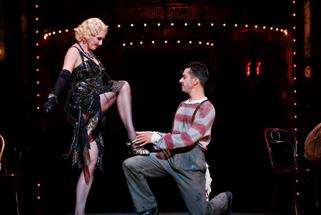|
Back
Weimar Berlin, and all that Jazz Melbourne
State Theatre
11/07/2018 - & November 9, 12, 14, 16, 20, 24, 2018
Giacomo Puccini: La bohème
Maija Kovalevska, (Mimì), Yosep Kang (Rodolfo), Jane Ede (Musetta), Christopher Tonkin (Marcello), Richard Anderson (Colline), Christopher Hillier (Schaunard), Graeme Macfarlane (Benoît), Adrian Tamburini (Alcindoro), Clifford Plumpton (Officer), Anthony Mackey (Sergeant), Benjamin Rasheed (Parpignol)
Opera Australia Chorus, Michael Curtain (Acting Chorus Master), Orchestra Victoria, Pietro Rizzo (Conductor)
Gale Edwards (Director), Hugh Halliday (Revival Director), Brian Thompson (Set Designer), Julie Lynch (Costume Designer), John Rayment (Lighting Designer)

J. Ede, C. Tonkin (© Jeff Busby)
It takes only one glance around the capacity State Theatre to understand why Opera Australia revives this production of Puccini’s La Bohème as the opener for the Spring Season. So many scheduled performances, so many young faces in the audience and such a buzz about the foyers attest to its popularity and potential to initiate new-comers to the art form. According to Artist Director Lyndon Terracini, Gale Edwards’ 2013 production of La Bohème has played more times than any previous version by the company. It not only inducts and instructs but delivers full houses every time as a bonus. Opera Australia is doing well in its push to secure the opera audiences of the future.
Relocating the action to the last days of the Weimar Republic, enables Edwards to juxtapose the cold austerity of the artists’ garret against the sleazy cabaret glamour of Café Momus. Clearly a brothel of sorts, this realisation adds to the plot in that it offers Mimì a way out of her poverty which she will choose and eventually reject. It heightens our understanding of the action while adding the opportunity to stage a spectacular and brilliant second act with colour, movement and dazzle. The only snag to this strategy is the presence of children amid the semi-nudity and drag show.
Italian Conductor Pietro Rizzo returns to the production having led the 2017 revival in Sydney. He adds vigour to the reading of the score, particularly in the first act. Volume and pace, sometimes a little heavy in the wind section, underpin the boisterous exchanges between the young men who are arguably only flirting with this student lifestyle as Rodolfo willingly despatches the manuscript of his play to stoke the fire in the loft. Contrastingly, the desperation of the final act is brilliantly accentuated in his nuanced balance of the strings with the on-stage performers. Overall, this was a very satisfying performance by Orchestra Victoria.
Latvian Soprano Maija Kovalevska has performed Mimì on many famous stages in Europe and the Americas. This was her Australian debut and a performance which highlighted her acting as well as vocal proficiency. Her characterisation encapsulates, the naïve “girl next door” in the early scenes, pragmatic opportunist availing herself of a rich “protector” and culminating in a touching if medically unlikely desperation as her death approaches. Ms Kovalevska’s voice commands attention. She sang all elements of the role with clarity and variety; assured and confident, she is a sweet and sad Mimì who captures our affections.
Australian soprano Jane Ede has a resumé almost too long to print in the program notes. She reprises her Musetta achieving absolute ownership of the stage on almost every appearance. Her radiant voice has a gorgeous and powerful upper register which she utilises with accuracy and poise; even at times as a weapon to skewer the disaffected and the boorish. Ms Ede gave a stupendous performance developing a fully rounded character who wins admiration for her adroit understanding of how to use any situation to her advantage.
As Rodolfo, Korea tenor Yosep Kang achieved an admirable blend of youthful rowdy energy, jealous torment and despondency. He is perfectly plausible as a young writer with a hint that his lifestyle of poverty may be something of a choice to conform with his friends as he casually destroys his work. Mr. Kang has a strong and intense High C and uses it to memorable effect in the Act One duet, laying the ground for a poignant reprise as Puccini unashamedly tugs at the heart-strings, referencing that love song as Mimì lies dying.
Among the men, Gale Edwards creates a charismatic camaraderie. All performers imbue this clique with credibility and appeal but Christopher Tonkin as Marcello stands out as a most rounded and plausible character. The directorial decision to reunite Marcello and Musetta as they tear clothes off one another in the background to the Act Three love duet gives the audience a deeper appreciation of the macho charisma Mr. Tonkin generates.
Richard Andersons’ richly booming voice added gravity and weight to all his ensembles, especially with the other male voices. His rendition of the parody farewell to his coat in the final act drew hearty approbation and rounded out a sterling performance in this secondary role.
This show is a reliable stalwart in the company’s repertoire and patrons new and old continue to be charmed and won over by it. Given the tremendously appreciative audience response at the final curtain, there is no doubt that it will continue to be revived to meet audience demands.
Gregory Pritchard
|